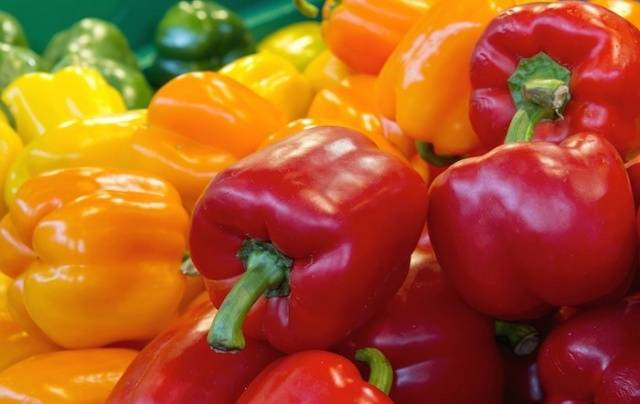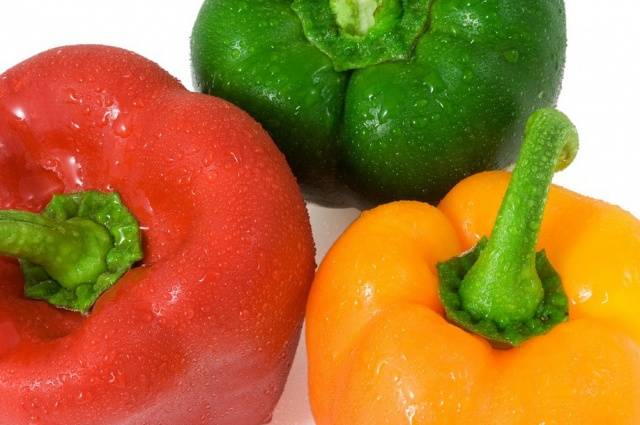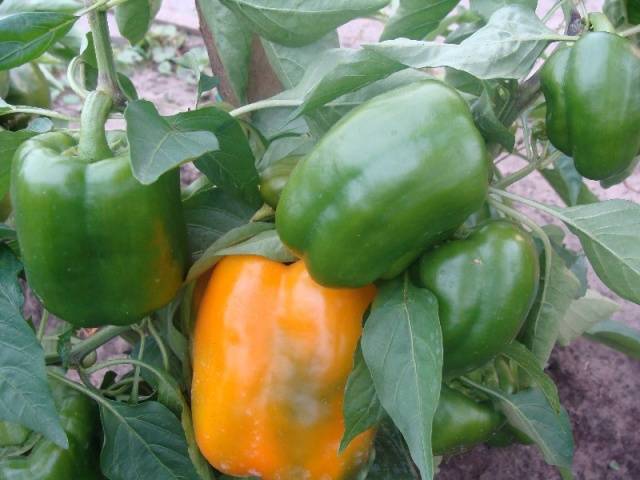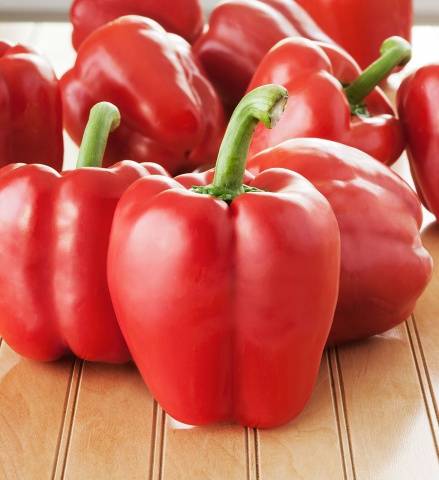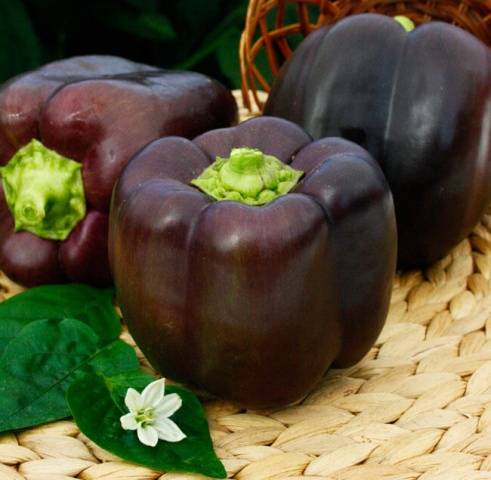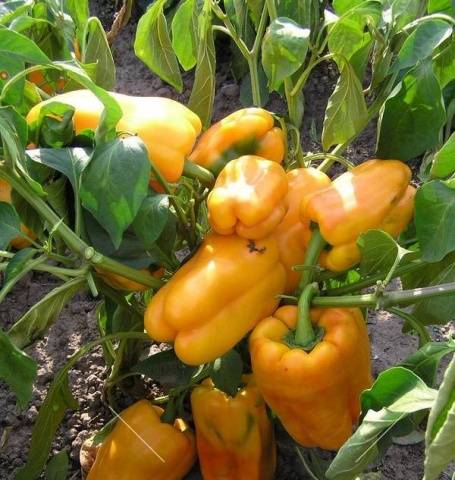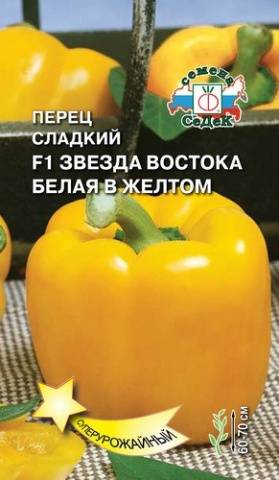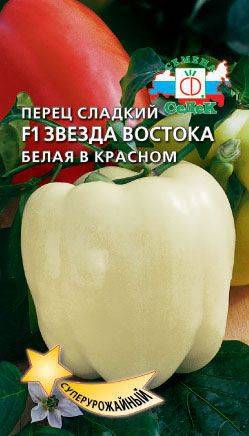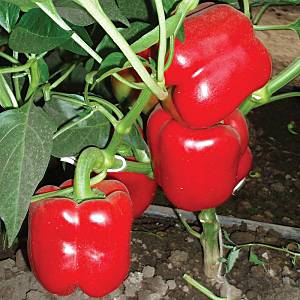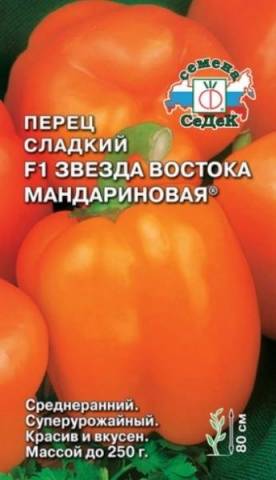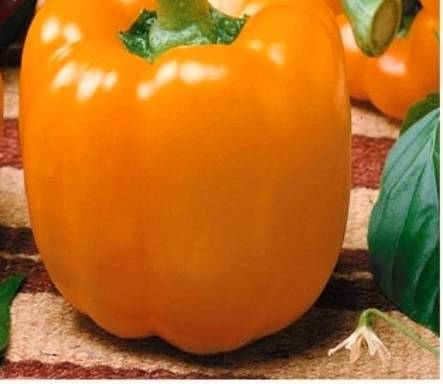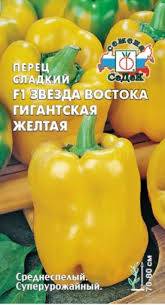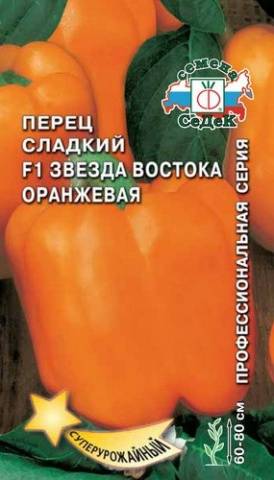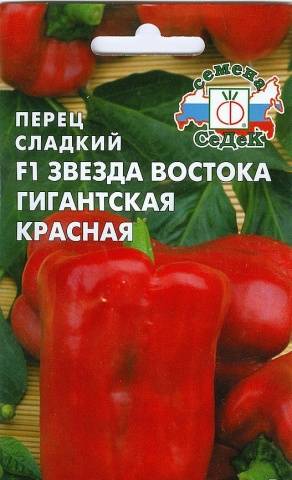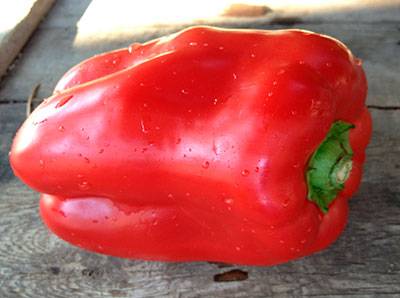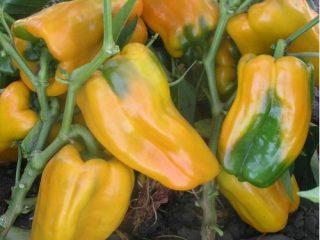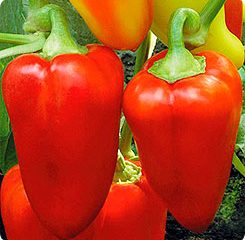Content
Sweet pepper is not an absolutely accessible crop for growing in most regions of Russia due to its heat-loving nature and, at the same time, long vegetation periods. But what to do if many varieties, even at large sizes, are not yet distinguished by the most expressive taste, and even sometimes they are bitter? Probably, try to choose a variety of bell peppers, which will combine many useful characteristics, but, above all, excellent taste.
Pepper The Star of the East is unique not only for its taste characteristics, but also for the fact that it is a whole series of peppers of a wide variety of shades. Despite some difference in size, shape and, most importantly, in color shades, all varieties of Star of the East pepper are distinguished by an excellent sweet taste and juiciness, which are comparable to the best southern varieties, and which are confirmed by numerous reviews of gardeners. Of course, in the open field of regions with cool and short summers, it is unlikely that it will be possible to grow a decent harvest of these peppers. But, if you have any greenhouse or greenhouse, then you can surprise your family and guests with a rare combination of beauty, taste, juiciness and, of course, usefulness that distinguishes all vegetables grown on your own plot. Well, in the south, your pepper beds will have the opportunity to sparkle with a real fireworks of colors and, with a reasonable planting, can look even more picturesque than any flower bed. And your twists for the winter will be not only healthy and tasty, but also beautiful.
Description of the variety
Actually, all the sweet peppers in the Star of the East series are hybrids. This must be remembered so as not to be disappointed after sowing seeds harvested from grown pepper fruits.
The series includes the following varieties:
- Star of the East f1;
- Red;
- White;
- Golden;
- Mandarin;
- Orange;
- Yellow;
- Giant;
- Giant red;
- Giant yellow;
- Purple;
- Chocolate.
These sweet pepper hybrids were bred by specialists from the well-known Sedek seed company, which is located in the Moscow region. It is no coincidence that the sweet peppers of this series received such a romantic name - in cross-section, any of the fruits resembles a star.
Not all representatives of the Star of the East series were included in the State Register of Russia. This honor was awarded only to 7 hybrids - the Star of the East ordinary, White, Golden, Red, Tangerine, Violet and Chocolate. This happened more than 10 years ago in 2006-2007.
The above hybrids of the Star of the East sweet pepper differ not only in the color of the fruit, but also in other characteristics. The overwhelming majority of pepper varieties of this series can be attributed to early ripening hybrids - this means that, on average, 105-115 days pass from emergence to ripening of fruits at the stage of technical maturity. At a later date (after 120-130 days), only all three giant varieties and the Chocolate Star of the East ripen.
As already mentioned, all varieties are intended both for outdoor cultivation and under cover.
Pepper bushes are usually quite powerful, semi-spreading, medium in height (60-80 cm). The leaves are large, green, slightly wrinkled. In recent years, several unusual hybrids from this series have appeared - the Orange and Yellow Star of the East, which belong to the indeterminate species. That is, without forming, they can grow up to a meter or more. And when grown in winter heated greenhouses and formed into two stems, they can grow up to two meters in height and provide a yield per season of up to 18-24 kg of pepper fruits from one square meter of plantings.
And for conventional hybrids grown during one summer season, the yield varies, depending on the specific variety, from 5.8 to 11 kg of fruit per square meter.
The hybrids are resistant to tobacco mosaic virus and verticillary wilt. They ripen well in indoor conditions, being harvested at the stage of technical maturity. The fruits are well and long-term stored and are quite suitable for long-term transportation, which makes it profitable to grow these peppers on farms.
Varieties of the Star of the East
Pepper Star of the East in its traditional version has a rich dark red color of the fruit. But it is interesting that at the stage of technical maturity, the cuboid fruits of the pepper have a milky-creamy color, as they ripen, they become creamy-reddish and, finally, at the stage of complete biological maturation, they turn into a dark red color.
After all, the stage of biological maturation is only necessary for the full maturation of the seeds so that they can germinate well in the next season. But,
- firstly, the seeds can ripen well in peppers put to ripening in room conditions.
- secondly, in any case, it makes no sense to plant seeds from grown hybrids next year, since they will not repeat the properties of their parents. Therefore, it makes no sense to wait for biological maturation.
And all the peppers in this series are distinguished by an amazing and changeable color both at the stage of technical and biological maturation.
Purple
This hybrid does not have the highest yields (on average, about 6-7 kg / sq. Meter), but its fruits ripen relatively early and look very exotic. They turn dark purple at the stage of technical maturation, but at the stage of full maturity they become dark cherry. The walls of the peppers are of average thickness - 7 mm, the fruits are prism-shaped, weighing from 180 to 300 grams.
Chocolate
Pepper Chocolate Star of the East is not for nothing that it is mid-season in terms of ripening. Like many late varieties, it has a high yield - up to 10 kg / sq. meters and rather large fruit sizes - 270-350 grams. The color of the fruit for the peppers is also unique, but chocolate lovers will be disappointed - at the stage of full ripening, the peppers become not quite chocolate, but rather dark red-brown. And in the period of technical maturity, the color of the fruit is dark green. In addition to its excellent taste, this hybrid has a peculiar peppery aroma.
Golden
This hybrid has no particularly outstanding characteristics, except for the amicable ripening of the fruits. His yield is average - about 7.5 kg / sq. meters. The size of the fruits is also average - about 175-200 grams with a wall thickness of about 5-7 mm. The dark green, firm, juicy fruits turn bright yellow when fully ripe.
White
Pepper White Star of the East becomes milky white only during the period of technical maturation.If you still leave it to ripen on the bush, then soon the fruits will turn dark yellow. By the way, in this sense, it differs little from the hybrid of White pepper in the yellow star of the east.
Only the yield at the White Star is slightly higher (up to 8 kg / sq. Meter) and the wall thickness reaches 10 mm.
White in red
And in this variety of the Star of the East, the cuboid fruits after a period of white color gradually turn red. Productivity, wall thickness and fruit size are average.
Red
This hybrid differs from the traditional prismatic shape of the fruit, as well as the fact that at the stage of technical maturity, the fruits are colored dark green. Pepper Red Star of the East is also characterized by a weak but peculiar peppery aroma.
Tangerine
One of the most interesting varieties of this series of peppers. The yield can reach 8-9 kg / sq. meters. The fruits themselves cannot be called small either, they reach a mass of 250-290 grams. After passing through a dark green hue, when fully ripe, the peppers become a rich dark orange color. The fruits are particularly juicy with a wall thickness of 8-10 mm and a rich peppery aroma.
Yellow
The yellow and orange varieties of the Star of the East pepper differ only in color at the stage of biological maturation, which coincides with the name of the variety. In the technical period of maturity, they are dark green in color. Both hybrids are early maturing and are characterized by unlimited growth. On each bush, up to 15-20 fruits can ripen at the same time, weighing an average of 160-180 grams. Although the mass of the largest peppers can reach 250 grams. These hybrids are best grown in heated greenhouses.
Giant
Among the peppers of the Star of the East series, three varieties are known with medium ripening periods and rather large fruits, weighing up to 400 grams - Giant, Giant red and Giant yellow. Moreover, the first two hybrids practically do not differ from each other. In the latter variety, as you might guess, fully ripe fruits are colored bright yellow. In the period of technical maturity, the fruits of all three hybrids are dark green in color. The bushes grow quite high, up to one meter. And although the size of the peppers is quite significant, these hybrids do not differ in special yield. On one bush, on average, from 7 to 10 fruits ripen.
Testimonials
Conclusion
The peppers of the Star of the East series could be called ideal. Only due to the rather high growth and the abundance of relatively large fruits do they need a mandatory garter. Perhaps this would be the only drawback of this series of pepper, if not for the too frequent complaints of gardeners about the poor germination of seeds of this series in recent years.
